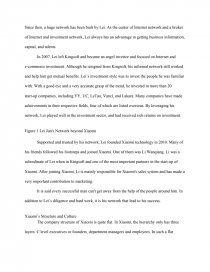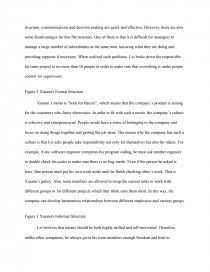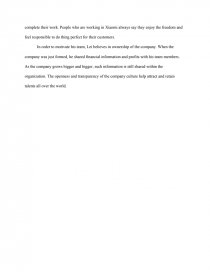Lei Jun and His Networking Stories
Essay by Jing Liu • January 20, 2019 • Research Paper • 958 Words (4 Pages) • 790 Views
Lei Jun, fondly known is “Leibs”, China’s Steve Jobs, is the founder and CEO of Xiaomi, a privately-held firm that is one of the largest Chinese smartphone makers. With its IPO approaching this year in Hong Kong, Xiaomi is expected to raise at least US$10 billion to become the world's largest new technology stock this year, and Lei Jun is expected to become China's newest richest man.
Lei was born on 16 December 1969 in Hubei, China. In 1991, he graduated from university with a BA in computer science. From a student to the Chinese richest, networks play a critical role in his success.
When Lei was in university, he got to know Wang Quanguo, a technician working for a computer company at that time. As Wang suggested, the two people worked together to make an encryption software in the summer vacation. Wang was responsible for the interface, Lei was responsible for the kernel. It took only two weeks to complete the software, named YellowRose. The successful release of YellowRose not only helped Lei accumulate confidence and experience in software development, but also won Lei fame in the industry and won the favor of Kingsoft, a famous software company in China.
One year later, Lei was invited by Qiu Bojun, the VP of Kingsoft, to join the company as an engineer. And introduced by Lei, Wang Quanguo also joined Kingsoft years later, who now is the VP of the company.
Lei worked in Kingsoft for 16 years. Helped by Qiu, Lei soon became the CEO of the company in 1998 and lead it towards IPO. On October 16, 2007, Kingsoft Software was listed on the stock exchange of Hong Kong. In the 16 years in Kingsoft, he managed to know and establish connections with a lot of elites and talents both in Internet and investment industries. Since then, a huge network has been built by Lei. As the center of Internet network and a broker of Internet and investment network, Lei always has an advantage in getting business information, capital, and talents.
In 2007, Lei left Kingsoft and became an angel investor and focused on Internet and e-commerce investment. Although he resigned from Kingsoft, his informal network still worked and help him get mutual benefits. Lei’s investment style was to invest the people he was familiar with. With a good eye and a very accurate grasp of the trend, he invested in more than 20 start-up companies, including YY, UC, LeTao, Vancl, and Lakara. Many companies have made achievements in their respective fields, four of which are listed overseas. By leveraging his network, Lei played well in the investment sector, and had received rich returns on investment.
Figure 1 Lei Jun's Network beyond Xiaomi
Supported and trusted by his network, Lei founded Xiaomi technology in 2010. Many of his friends followed his footsteps and joined Xiaomi. One of them was Li Wanqiang. Li was a subordinate of Lei when in Kingsoft and one of the most important partners in the start-up of Xiaomi. After joining Xiaomi, Li is mainly responsible for Xiaomi's sales system and has made a very important contribution to marketing.
It is said every successful man can't get away from the help of the people around him. In addition to Lei’s diligence and hard work, it is his network that lead to his success.
Xiaomi’s Structure and Culture
The company structure of Xiaomi is quite flat. In Xiaomi, the hierarchy only has three layers: C level executives or founders, department managers and employees. In such a flat structure, communications and decision making
...
...



